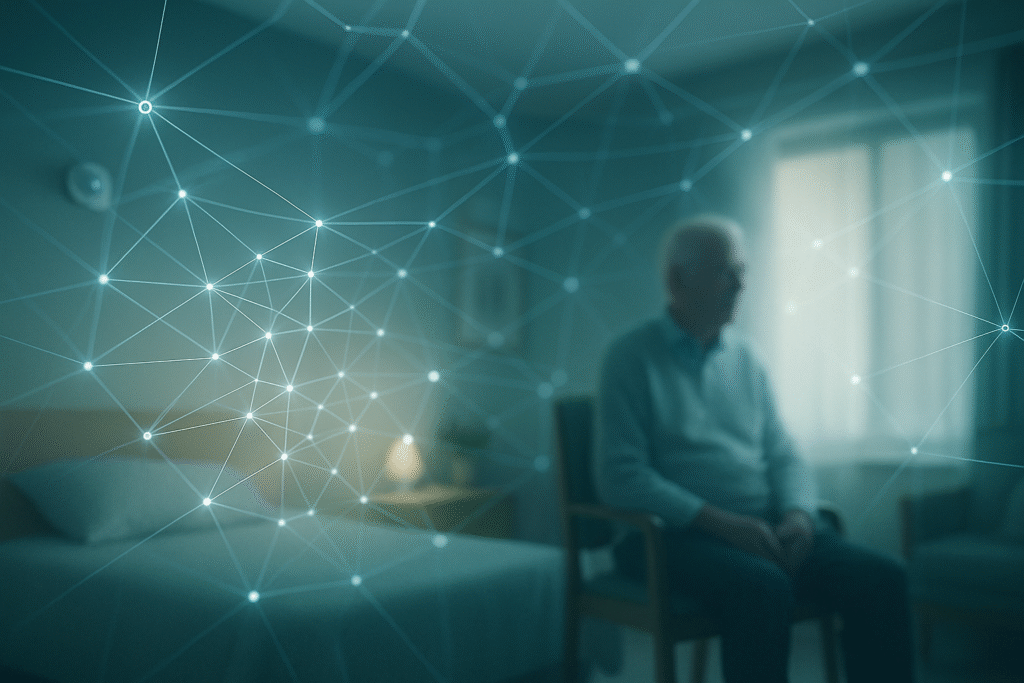
The landscape of senior care is undergoing a profound transformation, spearheaded by the innovative application of artificial intelligence. At the forefront of this revolution are AI-powered tools designed to tackle one of the most pressing challenges in elder care: fall prevention, especially within memory care centers. Solutions such as AUGi (Augmented Intelligence) are not merely incremental improvements; they represent a paradigm shift from reactive incident response to proactive, predictive intervention. This critical development promises to significantly enhance resident safety, preserve dignity, and alleviate the immense physical and emotional burden on caregivers, marking a pivotal moment in the integration of AI into human-centric services.
The immediate significance of AI in this domain cannot be overstated. Falls are a devastating reality for older adults, with the Centers for Disease Control and Prevention (CDC) reporting tens of thousands of fall-related deaths annually. In memory care settings, the risk escalates dramatically, with individuals facing an eightfold higher chance of falling and triple the risk of serious injuries. AI systems like AUGi, co-developed by Maplewood Senior Living and privately-held Inspiren, Inc., are leveraging advanced computer vision and machine learning to continuously monitor, learn, and anticipate resident needs, fundamentally redefining what is possible in safeguarding our most vulnerable populations.
Technical Prowess: Unpacking AUGi's Predictive Power
AUGi, developed by Inspiren, Inc., stands as a prime example of this technological leap. It is an AI-powered care companion device, discreetly installed in resident apartments, built upon proprietary Geometric Exoskeletal Monitoring (GEM) technology. This innovative system continuously tracks the skeletal geometry and movement of a human body, providing 24/7 smart monitoring. Crucially, AUGi prioritizes privacy through its HIPAA-compliant design, using blurred stick-figure imagery and computer vision skeleton representations instead of clear, identifying visuals, thereby ensuring dignity while maintaining vigilant oversight.
Technically, AUGi differentiates itself significantly from previous approaches. Traditional fall detection systems, often found in wearables or basic motion sensors, are largely reactive; they detect a fall after it has occurred. These systems typically rely on accelerometers and gyroscopes to register sudden impacts. In contrast, AUGi's advanced AI algorithms learn individual movement patterns, sleep rhythms, and daily routines. By analyzing subtle anomalies in gait, balance, and out-of-bed habits, it can predict instability and potential falls, alerting caregivers before an incident happens. This predictive capability allows for proactive intervention, a fundamental shift from post-fall response. Furthermore, its non-intrusive, wall-mounted design avoids the issues of resident non-compliance or privacy concerns associated with wearables and traditional video surveillance.
Initial reactions from the senior living industry and experts have been overwhelmingly positive. Pilot programs and implementations have demonstrated remarkable effectiveness, with studies reporting an average reduction of 64% in falls and falls with injury in assisted living facilities. This success is not just statistical; it translates into real-world benefits, such as significantly faster response times (from an average of 45 minutes to as little as four minutes in some cases) and the detection of critical events like unreported falls or even strokes. Caregivers praise AUGi for reducing false alarms, enabling more targeted care, and providing a "virtual rounding" feature that can increase staff "touchpoints" with residents by as much as 250%, all while enhancing peace of mind for families.
Competitive Landscape: AI's Footprint in Senior Care
The burgeoning market for AI in senior living, projected to reach USD 322.4 billion by 2034, presents immense opportunities and competitive implications across the tech industry. Specialized AI companies and startups, like privately-held Inspiren, Inc. (developer of AUGi), are clear beneficiaries. These companies are innovating rapidly, creating AI-native software tailored to the unique demands of elder care. Inspiren's recent securing of $100 million in Series B funding highlights strong investor confidence in this niche, signaling a robust growth trajectory for specialized solutions. Other startups such as CarePredict and ElliQ (Intuition Robotics Inc.) are also gaining traction with their predictive analytics and companion robots.
For tech giants, the impact is multifaceted. Cloud service providers such as Amazon Web Services (NASDAQ: AMZN), Microsoft Azure (NASDAQ: MSFT), and Google Cloud (NASDAQ: GOOGL) stand to benefit from the increasing demand for robust infrastructure to support AI model deployment and data processing. Hardware manufacturers like Samsung (KRX: 005930) and Apple (NASDAQ: AAPL) will find new avenues for their smart home devices and wearables as integral components of AI-driven senior care. The competitive landscape is shifting towards integrated ecosystems, pushing major players to either offer comprehensive platforms or forge strategic partnerships and acquisitions with specialized startups to gain expertise in this vertical, as exemplified by Microsoft's collaboration with KPMG on AI solutions in healthcare.
The potential disruption to existing products and services is significant. Traditional reactive monitoring systems and fragmented care management software face obsolescence as AI offers proactive, integrated, and more efficient solutions. AI's ability to automate administrative tasks, predict risks, and personalize care fundamentally challenges older, less data-driven models. This disruption necessitates a re-evaluation of current offerings and a strategic pivot towards AI integration. Companies that can demonstrate clear ROI through reduced falls, improved staff efficiency, and enhanced resident well-being will secure a dominant market position. Privacy-first design, as championed by AUGi's blurred imagery, is also emerging as a crucial strategic advantage in this sensitive sector, building trust and fostering wider adoption.
Broader Implications: AI's Role in an Aging Society
The integration of AI into senior living facilities, particularly through innovations like AUGi, represents a profound shift in the broader AI landscape and healthcare trends. It aligns perfectly with the overarching movement towards personalized medicine, predictive analytics, and the augmentation of human capabilities. Rather than merely automating tasks, this application of AI is tackling complex human needs, such as maintaining independence, preventing critical health incidents, and combating social isolation, thereby enhancing the overall quality of life for an aging global population. This signifies AI's evolution beyond computational tasks into deeply human-centric applications.
The societal impacts are largely positive, offering extended independence and improved safety for seniors, which in turn reduces the immense burden on healthcare systems and family caregivers. Proactive fall prevention and continuous health monitoring translate into fewer hospitalizations and emergency room visits, leading to substantial cost savings and ensuring timely, appropriate care. As the global population ages and caregiver-to-senior ratios dwindle, AI provides an innovative and scalable solution to address labor shortages and meet the escalating demand for quality care. This empowers seniors to age in place with greater dignity and autonomy, offering peace of mind to their families.
However, the widespread adoption of AI in senior living is not without its concerns. Privacy and data security remain paramount. While AUGi's privacy-preserving imagery is a commendable step, the continuous collection of sensitive personal and health data raises questions about data ownership, potential misuse, and breaches. Ethical considerations surrounding autonomy, informed consent (especially for those with cognitive decline), and the potential for dehumanization of care are critical. There's a delicate balance to strike between technological efficiency and maintaining the "human touch" essential for compassionate care. While AI is largely seen as augmenting human caregivers, concerns about job displacement in certain administrative or less complex monitoring roles persist, necessitating a focus on reskilling and upskilling the workforce.
Compared to previous AI milestones, such as expert systems or early machine learning applications, AI in senior living marks a significant advancement due to its shift from reactive treatment to proactive, predictive prevention. This level of personalized, adaptive care, continuously informed by real-time data, was previously unachievable at scale. The seamless integration of AI into daily living environments, encompassing smart homes, wearables, and comprehensive monitoring systems, underscores its ubiquitous and transformative impact, comparable to the integration of AI into diagnostics or autonomous systems in its potential to redefine a critical sector of society.
The Road Ahead: Future Developments in AI Senior Care
The trajectory for AI in senior living, exemplified by the continued evolution of tools like AUGi, points towards an increasingly sophisticated and integrated future. In the near term, we can expect to see enhanced real-time monitoring with even greater accuracy in anomaly detection and personalized risk assessment. AI algorithms will become more adept at integrating diverse data sources—from medical records to environmental sensors—to create dynamic, continuously adapting care plans. Medication management systems will grow more intelligent, not just reminding but actively predicting potential adverse effects or interactions that could lead to falls.
Looking further ahead, the long-term vision includes highly sophisticated predictive analytics that function as a "smoke detector for your health," anticipating a broader spectrum of health deteriorations well in advance, not just falls. This will lead to integrated health ecosystems where AI seamlessly connects operational, clinical, and lifestyle data for a holistic understanding of resident well-being. Experts predict the rise of more empathetic and adaptive socially assistive robots capable of complex interactions, profoundly addressing loneliness and mental health. Automated care plan generation, personalized wellness programs, and smart incontinence monitoring are also on the horizon, all designed to foster greater engagement and dignity.
However, several challenges must be addressed for this future to be realized ethically and effectively. Paramount among these are ethical considerations surrounding privacy, autonomy, and the potential for dehumanization. Robust regulatory and policy frameworks are urgently needed to govern data security, informed consent, and accountability for AI-driven decisions. Technical limitations, such as ensuring data quality, reducing false alarms, and overcoming the "black box" nature of some AI models, also require ongoing research and development. Furthermore, the cost of implementing advanced AI solutions and ensuring digital literacy among both seniors and caregivers remain significant adoption barriers that need innovative solutions. Experts, including Dylan Conley, CTO for Lifeloop, predict that AI will have "staying power" in senior living, emphasizing its role in augmenting human care and improving operational efficiency, while urging policymakers to enforce ethical standards and mandate rigorous audits of AI systems in eldercare.
A New Era of Elder Care: Concluding Thoughts
The application of AI technology in senior living facilities, particularly through innovations like AUGi, marks a pivotal moment in the evolution of elder care. The key takeaway is a fundamental shift towards proactive and predictive care, significantly enhancing resident safety and dignity by anticipating risks like falls before they occur. This represents a transformative leap from traditional reactive models, offering profound benefits in reducing injuries, improving response times, and providing personalized care that respects individual privacy through sophisticated, non-intrusive monitoring.
This development's significance in AI history lies in its successful deployment of complex AI (computer vision, machine learning, predictive analytics) to address deeply human and societal challenges. It showcases AI's capacity to augment, rather than replace, human caregivers, enabling them to deliver more focused and compassionate care. The positive outcomes observed in fall reduction and operational efficiency underscore AI's potential to revolutionize not just senior living, but the broader healthcare industry, setting a new benchmark for smart, empathetic technology.
In the coming weeks and months, watch for continued advancements in AI's predictive capabilities, further integration with holistic health ecosystems, and the emergence of more sophisticated personalized care solutions. Critical attention will also be paid to the development of ethical guidelines and regulatory frameworks that ensure these powerful technologies are deployed responsibly, safeguarding privacy and maintaining the human element of care. The journey of AI in senior living is just beginning, promising a future where technology truly empowers older adults to live safer, more independent, and more fulfilling lives.
This content is intended for informational purposes only and represents analysis of current AI developments.
TokenRing AI delivers enterprise-grade solutions for multi-agent AI workflow orchestration, AI-powered development tools, and seamless remote collaboration platforms.
For more information, visit https://www.tokenring.ai/.







